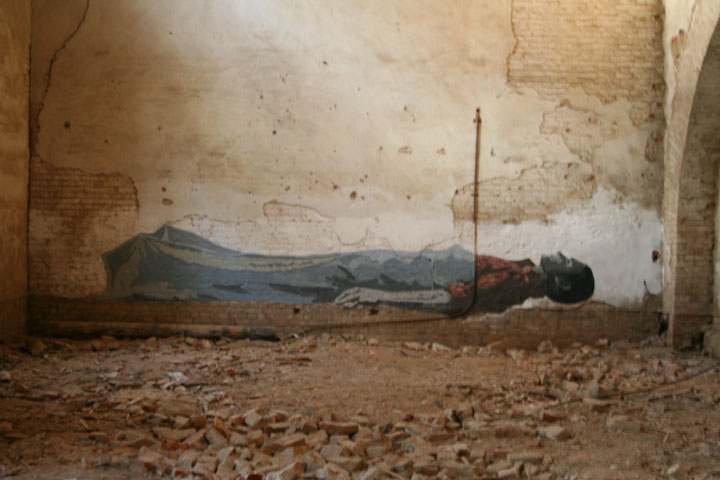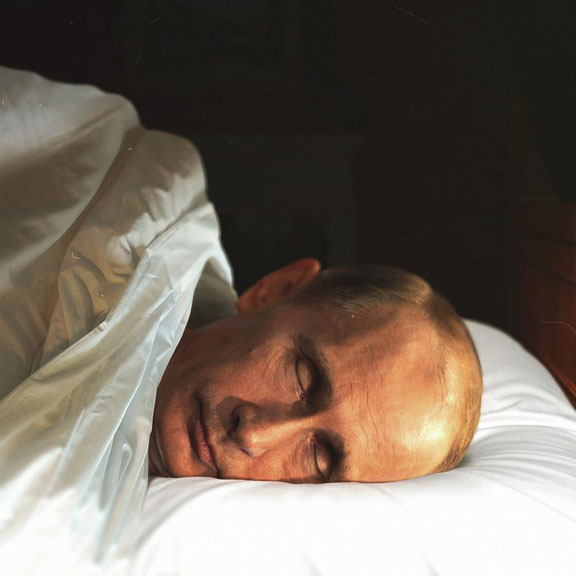Maria Chekhonadsikh: It seems that the state of sleep was always a peripheral topic in theory, one that was never part of the larger philosophical and political issues. As I understood from you, at the beginning of your research, which started in the first half of the 2000s, there were only a few references to sleep as a self-sufficient subject of study in the humanities.
Alexei Penzin: Indeed, when I started this research, very little work had been done in this field, a few more or less theoretical and eclectic attempts existed in sociology, empirical anthropology and history: like the pioneering work by the sociologist Murray Melbin “Night as Frontier: Colonizing the World After Dark,” which, published in 1987, was devoted to the ‘colonization of night-time.’ Other books which historically look at the subject are A. Roger Ekirch’s “At Day’s Close: Night in Times Past” (2005) and also the anthropological work by Brigitte Steger and Lodewijk Brunt “Night-time and Sleep in Asia and the West: Exploring the Dark Side of Life” (2003). As regards to philosophy, there was the book by the Austrian thinker Walter Seitter called “Geschichte der Nacht” [History of the Night, 1999]. I read it only later, after I had already started to elaborate a theoretical framework for my study, and was surprised by some shared intuitions and references that really inspired me in my enterprise, which at that time was sometimes perceived as unusual and exotic by a selection of my colleagues. Seitter’s book, being a pioneering and profound work, however, was quite removed in terms of my political concerns and the general Marxist framework of what I was conceiving as the problem of sleep in capitalist modernity. Then in 2007 the outstanding French philosopher Jean-Luc Nancy published a small book entitled “Tomber de sommeil” [The Fall of Sleep]. I both admired this book and was puzzled by it, partly because it stood in the way of the more political understanding of the problematics I was pursuing, instead encapsulating them inside a poetical and rather apolitical—though very insightful—reading. Also, I rather early on discovered the beautiful book by Emmanuel Lévinas’ “Existence and Existents,” published straight after World War II, and contains several parts on sleep, insomnia and subjectivity, which were very important for my work. But, from the very beginning my methodological ground was the chapter from Karl Marx’s “Capital” called The Working-Day in which Marx writes about sleep and the wakefulness of the worker. At that time the average working day could last between 16 and 18 hours and these problems were easily visible. Marx uses the metaphor of a vampire to describe capital; a vampire that attacks at night and sucks “the living blood of labour”. As Marx explicitly states there, capitalist production “by its inherent nature” is aimed at 24 hours in the day appropriation of labour, which leaves no structural place for sleep at all.
Just recently a well-written new book was published. I mean Jonathan Crary’s “24/7: Late Capitalism and the Ends of Sleep” (2013), which is quite similar to my approach. It is an important research that stresses how late capitalism now attempts to capture our attention, gaze, motility, the entire wakeful brain functioning and analyses new social media and mobile technologies as means of this colonization of everyday life. Sleep, in Crary’s view, is the only “natural barrier” for this 24/7 mode of production and control. But in this perspective I miss a discussion of inner, productive, constitutive forces of sleep. Otherwise sleep may look as a theological concept, as a sort of katechon, which impedes a final triumph (or, actually, an apocalypse) of the 24/7 regime… That is why in my research I explore a function of sleep beyond its natural qualities, as not just a negative break in this 24/7 oppressive continuity or just as a part of means of reproduction of labour force, but as something, which is related to the intimate core of our subjectivity, as a condition for its constitution.
MC: Indeed, over the last few years researchers began discussing sleep in various contexts, ranging from the analysis of the contemporary 24-hour society to the representations and practices of sleep that is customary to various cultures. These approaches stress the late capitalist, or neoliberal, ideology of the permanent mobilization of individuals for labour or consumption. In fact, problematization of this kind is quite far removed from the fundamental rethinking of sleep as an ontological or anthropological problem. What do you think about this new stream in theory and research?
AP: To outline problems that are specific to my research we should start from zero. We can ask a simple question: What is a sleeping human being (a sort of ‘homo dormiens’, to put it in an ironic Latinized way)? The answer is not obvious. Of course, animals sleep too, but in the case of humans, the elementary biological fact of sleeping is transfigured; it acquires new cultural and social dimensions, even political ones in my view. Or, to put it better, my project is about human problematization, to use Michel Foucault’s term, of such a biological process as sleep. We can take as an example the practice of vigilance, which entails a conscious deprivation of sleep. And it is not only about such human practices, but also about thinking about sleep and imagining it. The general idea is that this human problematization of sleep is not just another particular problem. It can shed some light on other issues that are present in politics, society or aesthetics. It returns to the field of thinking that which has been excluded from it, and this inclusion could change the whole field.
Actually, I suggest a coming out of a ‘vigilance complex’ that is embedded in philosophy and theology, as well as in politics and in economic infrastructures. Classical and modern philosophy, as we know it, is based on the paradigm of a wakeful, non-sleeping subject. Moreover, in its public practice philosophy aims at waking people up since its origins, Socrates referred to himself as a gadfly that bites people in order to awaken them. We could trace this waking-up function of philosophical initiation up to 20th century radical thought. For example, the contemporary philosopher Alain Badiou reiterates these metaphors of the “vigilance complex,” for example, by writing in one of his recent essays that the philosopher is a ‘guardian of truth’ who keeps vigilance even during the night: “Because we have to protect the fragile new idea of what is a truth. To protect the new truth itself. So, when the night falls, we do not sleep. Because, once more, "we must endure our thoughts all night". The philosopher is nothing else than, in the intellectual field, a poor night watch-man”.
This is a critical part of my research, which opens a new space for investigation. In the constitutive part of my research, I am interested in sleep as a crucial experience of passivity, isolation, non-communication and non-productivity. And indeed, the inclusion of the experience of sleep might be a crossing point for many contemporary discourses, which would enable their re-articulation. How? I will briefly outline several points.
Firstly, sleep is a natural obstacle for the pragmatic values that have been established in modern capitalist societies over the course of several centuries. These are the principles of productivity, efficiency and rationality. In the light of these principles, the only alibi, or excuse for sleep, is that it provides recreation, relaxation and recuperation for the labour force. If it were possible to speed up time or reduce the need for recreation, I believe, modern wo/men would prefer not to sleep at all. After the retreat of religion, modern wo/men no longer believe in the infinity of their existence, they are obsessed with the effective use of the finite time that is allotted to them. In contemporary culture you can find many examples of such an attitude to sleep. There are many techniques and means, including pharmacological, which enable us to control the duration of sleep. Saying more theoretically, the merging of the borders between work and life in contemporary “cognitive capitalism,” a phenomenon which has been lively discussed in critical theory and social sciences, is evidence of the fact that the general colonization of society by capital and its axioms (not only concerning wakefulness and sleep) has been completed. Marx called this state of things the ‘real subsumption’ of society under the rule of capital. The question of sleep in cognitive capitalism sheds some light on the overall logic of the system of incessant, uninterrupted, sleepless production, cognitive operations, communication and monitoring. In this new zone of indifference between work and life, sleep has a special position: as the only non-working time. This makes it ambivalent; from the point of view of capital, it is negative, from the contemporary ‘creative’ and precarious worker’s (whose entire life is work) perspective, it is rather positive.
If for Fordism the key sleep disorder was insomnia, based on a disruption of disciplinary temporality of industrial capitalism, for post-Fordism, or cognitive capitalism, it is probably so-called sleep apnoea, which is associated with involuntary interruptions of breathing during sleep. It is a secret illness, as those who ‘promote’ this disorder in the market of new medical services argue. It has no visible symptoms; it can be diagnosed only after a long (and expensive) laboratory study. If insomnia is visible, agonizing many modernist writers and artists with its hysterical staging of the “vigilance imperative” of capitalism, apnoea is concerned with dangerousness and ambivalence of sleep itself. Hence, this new interest in sleep has began to surface in the media and the public sphere, as well as a desire to use sleep as a kind of natural biological ‘capital,’ a resource which can be individually managed and calculated. The proliferation today of institutions which study sleep, as well as popular self-help books on “how to sleep better” are also results of this conjuncture – as are nightclubs, Internet, 24/7 services, etc. Take, for example, the famous and already old movie The Matrix (1999): in the film sleeping bodies are used as living batteries, power sources for machines, which have seized control over humans. This is probably the most secret desire of contemporary capitalism – to put everything to work, to make profit even from sleep.
Secondly, it is very important to understand how the phenomenon of sleep was viewed throughout the history of philosophical and political thought. One could trace several models of thinking about sleep. Some are extremely negative, as in Plato’s project of an Ideal State. The order of this State eliminates sleep in general because, as Plato argues in his final work, “Laws” [Nomoi], when the citizens of this State are asleep they lose connection both with logos, rationality, and with the political body of society. When asleep, men and women are useless, uncontrollable, and unreasonable. In fact, Plato said that a sleeper is no better than a dead man! Later, from this perspective, the figure of a ‘non- sleeping king’, Rex Exsomnis, appears in medieval theological thought. Generally, in many cultures, not just in European, the rituals of power are closely linked to the practice of vigilance. For instance, the code of the ancient Chinese noble rulers depicts the model ruler as someone who is permanently awake at night, as it is assumed that he spends his nights in meditation on the welfare of his subjects and the improvement of his governance… And modern power, as it was famously described by Foucault and later Gilles Deleuze, is closely related to a multitude of monitoring, controlling and tracking devices, which never cease to function, as a result they ‘do not sleep.’ This uninterrupted functioning, or vigilance of power covers the entire body of the society.
Finally, a positive model for understanding sleep can be found in Aristotle’s writings – in the treatise “On Sleep and Wakefulness” and in his “Metaphysics.” Here sleep is not connected to logos, reason, but rather it is seen as part of the process of life, in which it plays a crucial role by preventing the immediate waste of vital energy. Sleep suspends human faculties and charges them with potential. We later discover elements of these models in modern philosophy, for example, especially interesting in Hegel. As you can ascertain if you read § 398 of Encyclopedia of the Philosophical Sciences, which was very the inspiring for me, the Hegelian sleep is ambivalent: on one hand, it is a dropping out from universal rationality, Geist, etc.; and on the other, it is the highest form of subjectivity, i.e. it is complete interiority, an ‘absolute potency’ of residing in itself. In 20th century philosophy, or more precisely, in those infrequent statements on the topic of sleep that are relevant to the context of my research, we can find an even more positive understanding of sleep. For example, Lévinas thinks of sleep as a subject formation “support,” comparing a sleeping human being to a refuge from the pressures and brutalities of the wakeful daily world that is characterized by anonymous and alienated rationality. In sleep, we are as if absolute ‘subjects without being’ but we still exist, in a potential form, which is the safe, mute and secret ground of our existence.
To connect all the points, the general premise of my research is that the capitalist order, far more strongly than any social order before it, privileges wakeful and active time over passivity and non-productivity and reasserts old metaphysical ideas, which shared the same preferences. I think, even at a deeper ontological level, late capitalism is the first social-economic and power formation, which “reveals” a vigilance of being itself, this ontological “vigilance” or “insomnia” of being itself which never leaves us; it never let us go “alone” from being. As Marx once said, only the late, ripe and developed social forms fully discover their origins, some “primitive” forms. Contemporary power and capital, which tend to be absolutely continuous, are probably just two mirrors of this absolute continuity of being itself (even a void continues to be). From this perspective, one could presuppose an ontological dispositif of this forced and violent continuity. The grip of this dispositif now is fully visible in devastating evidence of the contemporary “continual” capitalism; its possible deactivation is a big question of a radical thought and politics to come.
1 Badiou, Alain, 2006. “Bodies, Languages, Truths.” Lacan.com (accessed at http://www.lacan.com/badbodies.htm)
2 Plato, 1926. Laws, vol. 2. London: William Heinemann, p. 69.
3 Kantorowicz, Ernst, 1997. The King’s Two Bodies: A Study in Mediaeval Political Theology. Princeton: Princeton University Press, p. 131.
4 Levinas, Emmanuel, 1978. Existence and Existents. The Hague: Martinus Nijhoff, p 69.


